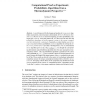Free Online Productivity Tools
i2Speak
i2Symbol
i2OCR
iTex2Img
iWeb2Print
iWeb2Shot
i2Type
iPdf2Split
iPdf2Merge
i2Bopomofo
i2Arabic
i2Style
i2Image
i2PDF
iLatex2Rtf
Sci2ools
117
click to vote
BIRTHDAY
2003
Springer
2003
Springer
Computational Proof as Experiment: Probabilistic Algorithms from a Thermodynamic Perspective
Abstract. A novel framework for the design and analysis of energy-aware algorithms is presented, centered around a deterministic Bit-level (Boltzmann) Random Access Machine or BRAM model of computing, as well its probabilistic counterpart, the RABRAM. Using this framework, it is shown for the first time that probabilistic algorithms can yield asymptotic savings in the energy consumed, over their deterministic counterparts. Concretely, we show that the expected energy savings derived from a probabilistic RABRAM algorithm for solving the distinct vector problem (or DVP for short ) introduced here, over any deterministic BRAM algorithm grows as Ω nlog n n−εlog(n) , even though the corresponding deterministic and probabilistic algorithms have the same (asymptotic) timecomplexity of Θ(n). Also, our probabilistic algorithm is guaranteed to be correct with a probability p ≥ (1− 1 nc ) (for a constant c chosen as a design parameter). As usual n denotes the length of the input instan...
Applied Computing | BIRTHDAY 2003 | Deterministic | Deterministic Bram Algorithm | Probabilistic Algorithm |
| Added | 06 Jul 2010 |
| Updated | 06 Jul 2010 |
| Type | Conference |
| Year | 2003 |
| Where | BIRTHDAY |
| Authors | Krishna V. Palem |
Comments (0)

